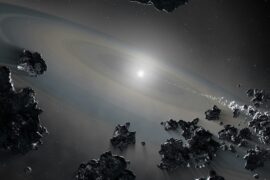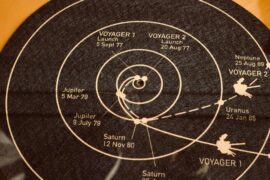Looking at the stars for inspiration to name a girl is a great idea. The names of galaxies, constellations, stars, and moons have deep, beautiful meanings, are inspiring, and just sound very cool.
There are many options to choose from when it comes to names for girls inspired by space and astronomy. There are names that have Latin roots and sound strong and mythological. There are names of Arab, and Asian origin that are reminiscent of exotic lands while being deep in meaning. And there are new and original names that sound modern.
Whatever type of name you are looking for, I’m sure there’s something in this list that you’ll like and at least put in your shortlist of candidates for the definitive name you are looking for.
There’s no specific order in this list. I believe there’s something worth considering for each. You will find a small explanation with the meaning below each of them. We have already made a list of astronomy baby names in the past, but we wanted to expand on it and focus specifically on girl names.
Here’s the list of ideas of space and astronomy names for girls.
1. Astrid
It means “divine beauty” in Nordic languages. It is also the name of a group of asteroids at the center of the asteroid belt.
2. Adrastea
One of Jupiter’s 53 moons. Derived from the name “Adrastus”, it means “inescapable” in Greek.
3. Alya
A star in the Serpens constellation. Part of a triple star system.
4. Amalthea
One of Jupiter’s inner moons. It comes from the Greek for “tender goddess”.
5. Ananke
One of Jupiter’s 53 moons. It means “fate personified” or “inevitability” in Greek.
6. Andromeda
It’s the name of the closest galaxy to our Solar System. It’s also the name of the constellation that contains it. It is of Greek origin and it comes from the myth of Andromeda, the daughter of Cassiopeia and King Cepheus.
7. Ara
One of the southern constellations. the name is derived from the word for “altar”.
8. Ariel
It means “lion of God”. It is the shiniest moon of the planet Uranus.
9. Astra
Derived from the Greek word for “star”.
10. Belinda
One of the 27 moons of Uranus. It is also derived from the Spanish word for “beautiful”. It is pronounced Ve-lynn-dah.
11. Bianca
One of the 27 moons of Uranus. It is derived from the Italian word for “white”. It is pronounced bee-an-cah.
12. Bellatrix
It is Latin for “beautiful warrior”. It’s the second brightest star in the Orion constellation.
13. Cooper
Name of the protagonist in the (wonderful) movie Interstellar.
14. Callisto
One of Jupiter’s inner moons. Named after the Greek myth of Callisto, a nymph who attracted the love of Zeus.
15. Cordelia
One of the 27 moons of Uranus. Of Celtic origin, it means “daughter of the sea”.
16. Carina
Pronounced Ca-ree-nah. It is the name of a constellation in the southern hemisphere. It comes from the Latin word for dear, or beloved. It is more commonly used as Karina in some countries.
17. Cassiopeia
One of the 88 constellations in the sky. It was named after the Greek myth of the beautiful queen Cassiopeia.
18. Celeste
Derived from the Latin word for sky. It means “of the heavens” or “of the sky”. It is also the word in Spanish to refer to a light blue color similar to the color of the sky.
19. Calypso
One of Saturn’s moons. It was named after a character in Homer’s Odissey.
20. Cybele
Pronounced Seev-e-le. It is the largest asteroid in the Solar System. Named after the Roman and Greek representation of the “great mother”.
21. Danica
It means “morning star”. From Slavic origin.
22. Dia
One of Jupiter’s moons. From the Greek for “across”. It also means “day” in Spanish.
23. Diana
Roman goddess of the Moon.
24. Despina
One of Neptune’s 14 moons. It means “lady” in Greek.
25. Dione
One of Saturn’s smaller moons. It means “goddess”. Pronounced as Dee-oh-ne.
26. Elara
One of Jupiter’s moons. From Greek mythology, it was the name of a nymph, lover of Zeus.
27. Electra
The name of one of the stars in the Pleiades cluster. It means “shining” or “amber”. It is also commonly written as Elektra.
28. Eliana
Derived from “Helios” (sun). It means “daughter of the Sun”.
29. Eris
It is the name of a dwarf planet in the Solar System located beyond Neptune. Named after the Greek goddess of strife and discord.
30. Galatea
One of Neptune’s 14 moons. derived from the Greek for “white damsel”.
31. Gaia
Primordial goddess in Greek mythology. Sometimes also used for “Earth” (the planet). The space observatory for the European Space Agency was named after it.
32. Galilea
The female version of Galileo, like the famous Italian astronomer.
33. Helene
One of Saturn’s moons. It has French roots and means “shining light”.
34. Haley
Name of a famous comet that is visible from Earth without a telescope every 75 years approximately. Named after its discoverer, Edward Halley.
35. Juliet
One of Uranus moons. French origin, it means “youthful”.
36. Juno
Name of the spacecraft sent to explore Jupiter’s moon. named after the queen of heavens in Roman mythology, and Jupiter’s wife.
37. Kalindi
Sanskrit for “the Sun”.
38. Kamaria
Swahili word that means “moonlight”.
39. Kara
Name of the science-fiction character Kara Thrace, from Battlestar Galactica.
40. Kari
One of Saturn’s moons. Name of Scandinavian origin that means “pure”.
41. Larissa
One of Neptune’s moons. In mythology, she was the lover of the god of the seas, Poseidon and they had three sons.
42. Leda
One of Jupiter’s 53 moons. In mythology, she was an Aetolian princess who became Sparta’s Queen.
43. Leia
Name of the Star Wars character, Leia Organa.
44. Lucy
A former white dwarf star in the Centaurus constellation that was crystallized and is completely made of diamonds.
45. Luna
The Spanish word for “moon”.
46. Lyra
One of the 88 constellations of stars in the night sky. It means “harp” or “song”.
47. Maia
A blue giant star in the Taurus constellation. In Greek mythology, she was the mother of the god Hermes.
48. Meissa
A star in the constellation of Orion. Name from Arabic origin meaning “the shining one”.
49. Miranda
One of Uranus’ moons. Latin roots, it means “to be wondered at”.
50. Monday
English roots. It means “day of the moon”.
51. Murphy
Name of the female protagonist in the movie Interstellar.
52. Nereid
One of Neptune’s moons. In mythology, the Nereids were the daughters of the sea god Nereus.
53. Norma
Four-star constellation, only visible in the southern hemisphere. It comes from the Roman word for “precept”.
54. Nova
In astronomy, a nova occurs when two stars clash and their brightness increases. It also comes from the Latin word for “new”.
55. Ophelia
One of the moons of Uranus. Greek for “aid” or “benefit”.
56. Pandora
One of Saturn’s moons. It means the “al-gifted”. Pandora was the first woman in Greek mythology.
57. Penelope
A large asteroid located in the asteroid belt, also classified as a candidate “minor planet”. It was named after Odysseus’ wife in Homer’s The Odyssey.
58. Phoebe
One of Saturn’s moons. Named after the grandmother of Apollo in Greek mythology. One of the Titans.
59. Phoenix
One of the 88 constellations. Named after the mythological fire bird that has the ability to be reborn from its own ashes.
60. Polaris
Bright star in the Ursa Minor constellation, also known as the “north star”.
61. Portia
One of Uranus’ moons. In Latin, it means “an offering”.
62. Padme
Name of a character in Star Wars. Padme Amidala, mother of Anakin Skywalker (Darth Vader).
63. Pan
One of Saturn’s moons. It comes from the hindi word for “sheperd”.
64. Rhea
Name of the second-largest moon of Saturn. Comes from the Greek word that means “flowing stream”.
65. Ripley
After the main character in the movie Alien, Ellen Ripley.
66. Sagan
After the famous astrophysicist, Carl Sagan.
67. Sally
After Sally Ride, the first American woman in space.
68. Sao
One of Neptune’s moons. Derived from the Latin word for “just”.
69. Sedna
Dwarf planet located beyond Neptune. Named after the Inuit goddess of the sea.
70. Selene
Derived from the Greek word for “Moon”.
71. Sol
Latin and Spanish word for “Sun”.
72. Soleil
French word for “Sun”.
73. Stella
Latin for “star”.
74. Sunday
English root, meaning “day of the Sun”.
75. Surya
In Hinduism, it is the name of the Sun’s deity.
76. Talitha
A star in the Ursa Major constellation. Name with Arabic roots that means “young girl”.
77. Tara
Sanskrit for “star”.
78. Thalassa
One of Neptune’s moons. Greek origin, meaning “the sea”.
79. Theia
A theoretical planet that according to some hypotheses would have collided with Earth to form the Moon. Named after a Titan goddess in Greek mythology.
80. Titania
The largest moon of Uranus. It means “land of giants”.
81. Vega
The brightest star in the Lyra constellation and one of the brightest stars in the sky. Name of Arabic origin that means “stooping eagle”.
82. Valentina
After Valentina Tereshkova, the first woman in space.
83. Venus
Venus is the second planet in the Solar System. Named after the Greek goddess of beauty and love.
Enjoyed this article?
Get daily 10-minute PDFs about astronomy to read before bed!
Sign up for our upcoming micro-learning service where you will learn something new about space and beyond every day while winding down.







